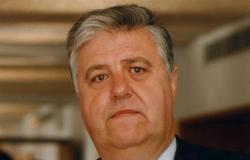Thursday, June 20, 2024, 18:56
| Updated 7:11 p.m.
“Philosophy was the great vaccine against stupidity and it is no longer so.” It is the disheartening reflection of José Antonio Marina (Toledo, 1939), patriarch of Spanish philosophers, who takes part in the volume ‘Twelve philosophies for the new world: where are human beings going?’, from the Fundamental Works collection of the Banco de Santander Foundation.
A dozen thinkers (six men and six women) philosophize about our past, present and future. Faced with eternal questions – who are we, where are we and where are we going? – they draw a panorama of contemporary Spanish thought. Some from an optimistic perspective and others with a decidedly pessimistic vision.
Together with Marina, the heterogeneous and original essays are signed by Ana Carrasco, José Luis Villacañas, Victoria Camps, Daniel Innerarity, Azahara Alonso, Carlos Blanco, Javier Echeverría, Eurídice Cabañes, Heike Freire, Josefa Ros and Antonio Lastra. They are epilogued by Ángel Gabilondo, Ombudsman and former Minister of Education.
Book cover.
Santander Foundation
Almost everyone confirms that the future and the present are technological but they have very different visions. For some, artificial intelligence is a useful tool, and for others a mere entelechy that “is neither intelligence nor artificial.”
With all her irony, Marina says that “we must leave pessimism for better times.” «Philosophy today is a disaster. It has forgotten its public service role. In such a destructive moment, it has abdicated the idea of truth to fall into the praise of multiculturalism that equalizes everything, glorifying opinion and weakening attention,” she laments. “Philosophy is in a low state, it has become tinged with skepticism, it is not the truth that matters but the power, and we philosophers must recover seriousness,” she claims.
Skepticism
But then the one of lime in the face of “the bad moment of philosophy”, he gives the one of sand and assures that “it can recover that primary role to teach us what we should know and reorder our lives ethically.” The key is, of course, “in education”, which must also be reformulated. So much so that Marina assures that she would think about it “a lot” if she had to study philosophy today. «There is intellectual laziness, and the key to overcoming it is education. “Students leave the degree with a devastating ethical skepticism,” she laments.
José Antonio Marina, thinker and professor.
R.C.
Marina believes, like Voltaire, “that history never repeats itself, but that human beings always repeat themselves, and they do so with a desperate melancholy.” “In the flight from the bombings of Malaga in the Civil War and in the flight from the bombings of kyiv, only faces change,” laments the thinker and professor, National Essay Prize winner and author of ‘Executive intelligence’, ‘Anatomy of fear ‘ or ‘Universal history of solutions’.
Disoriented
The tone of José Luis Villacañas (Úbeda, 1955) is also pessimistic, for whom, like “philosophers, we are a little disoriented” and “the human is the only thing that can be unfortunate.” “New technologies produce entropies that prevent us from metabolizing our own psychic detritus and destroy our thinking,” he argues. “It is clear that thinking must be strengthened, but the question is how,” says the professor of Philosophy. For him “democracy is linked to human dignity, that is, the ability to be autonomous, free agents and generate sentimentality and affectivity.” “If we are willing to think this, then we cannot take democracy for granted,” he said.
Javier Echeverría (Pamplona, 1948) states that “we have traveled from the human to the techno-human.” “We are in Telepolis and the challenge is to know where we are going,” says the philosopher, mathematician and professor of Logic and Philosophy. He converts Ortega’s ‘I am me and my circumstance’ into ‘I am me and my mobile phone’, since “we are more artificial than natural.” He believes that “the future is the past, as Leibniz said, and that technologies transform the future and the present, but also the past.” “We must not forget that language is memory and without it we do not know who we are,” says the author of ‘Telépolis’ and ‘Los Señores del Aire’, winner of the National Essay Award.
Carlos Blanco (Madrid, 1986) is committed to “idealism and imagination.” “They are necessary to transcend our limits,” says this theologian and chemist as well as a philosopher and professor at Comillas and Harvard. “The challenge is to think the unthought,” adds the author of essays such as ‘The Sense of Freedom’, ‘Great Philosophical Problems’ or ‘History of Neuroscience’.
For Josefa Ros (Murcia 1987) one of the great evils of our time is “the self-absorption that leads us to think selfishly about the self and distance ourselves from the we.” Specialized in the studies of boredom, the young thinker does not hide her “restlessness and anguish” in the face of this isolation “that leads us to stop thinking about a joint project.” She calls for a future in which human beings must “enhance” the philosophy of care, a topic she writes about in the book.
“We have separated ethics and morality from the rest of life,” laments ecophilosopher and green pedagogue Heike Freire, author of ‘Educating in Green’ and an international reference in educational transformation and human development in contact with nature.
€2/month for 4 months
Are you already a subscriber? Log in





